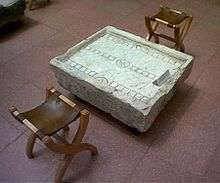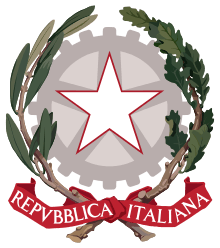Gambling in Italy
Gambling in Italy has existed for centuries and has taken on many forms. The history of gambling in Italy dates back to the days of the Roman Empire, when the predecessor of the modern backgammon, Ludus Duodecim Scriptorum became popular among the Roman legionnaires. It is also due to them that the game came to other European countries.[1]

It was in Venice, that in 1638 the first gambling house "Ridotto" was opened. It was sanctioned by the government aiming to control gambling activity of the citizens. Although the admission to that gambling house was free, only rich people could afford to play there, because the stakes were high. The games played were biribi resembling lottery and bassetta. Both games had a very high house edge. In 1774 "Ridotto" was closed which resulted in the growth of popularity of the closed gambling clubs. These clubs were called 'casinos', so the word 'casino' itself is of Italian origin.[2]
There is an opinion that baccarat was invented in Italy at the end of the 15th century by an Italian gambler Felix Falguerein.[3] Bingo is also of an Italian origin. In the 1530s, the Italians played game called 'Lo Giuoco del Lotto D’Italia' that resembled bingo.[4]
Gambling law
The Italian Criminal law proclaims gambling illegal, be it organized in a public place, an open-to-public place or a private club. At the same time, according to the Italian law, there's a difference between the games of luck and games where the outcome depends on the player's skills. Sports-betting, lotteries and some other activities fall into the category of legal and regulated gambling activities.
Only the State has the right to allow gambling. AAMS (Amministrazione Autonoma dei Monopoli di Stato – Autonomous Administration of the State Monopolies) is granted the power to issue licenses and regulate other gambling matters. The punishment for breaking the law ranges from fines to imprisonment.[5]
Italy has come a long way from totally prohibiting all gambling activities, to legalizing some of them under certain conditions. The main reason why the Italian government adhered to strict rules was the desire to avoid the possible negative effects associated with the industry. The following amendments liberalized the market in 2006:
- Legalisation of real-money skill games and betting exchange
- Opening of the Italian gambling market to operators from EU and EFTA countries (on condition they meet certain requirements)
- Opening of the new license tender that was supposed to rearrange the network of offline betting establishments and also providing possibility for online gaming operators to offer their services on a legal basis.[6]
The Finance Act 2007 was another milestone in the regulation of gambling in Italy. It legalized card games of skill, specifying that such games should be played in the form of a tournament with the stake equal to the tournament entry fee. This automatically legalized "Texas Hold'em". Other poker games as well as video poker games based on the same rules were prohibited as being dependent wholly on pure luck.
The "Comunitaria" decree (February 2011) was a real breakthrough for the gambling industry in Italy. It provided a regulation for cash poker games and casino games and also anchored changes introduced in the previous version of the decree.
One of its most notable aspects was the new tax regime based on the profit rather than on the turnover. A flat rate of 20% was to be applied to all newly legalized games except the video lottery games. Operators organizing sports and horse betting, lotteries and skill games still had to pay 3% of total tournament buy-ins sold.
Also, the new decree obliged operators to pay back to players at least 90% of the wagered money in the form of winnings. The maximum buy-in for a poker tournament was set at EUR 250 and the maximum initial stake for each gaming session could not exceed EUR 1,000.[7]
Online gambling
Liberalization of the Italian online gambling market gradually started in 2006, when following the complaint received in 2003, the European Commission investigated the case and started infringement proceedings against Italy. The reason for such action was very stringent Italian legislation prohibiting even legitimate European gambling operators to offer their online services in Italy. Only the Italian National Olympic Committee (CONI) and the National Horse Breeders Enhancement Society (UNIRE) were allowed to arrange sports betting offline and online. Websites run by other operators were blocked to prevent Italians from using them.[8]
As of November 2006, the blacklist of websites that didn't have Italian licenses and should have been blocked, contained 621 websites (including sites run by operators licensed in other EU states). Since the Italian authorities didn't notify the EC about the created, the country violated the EU Directive 98/34/EC (on provision of information in the field of technical standards and regulations).[9] Also, when prohibiting the functioning of any foreign operators, Italian authorities referred to the Criminal law. According to this law, organising a game of chance in a public place, an open-to-public place or a private club, was forbidden and could result in imprisonment and monetary sanction. Such activities required a special license and police authorization. However, this approach was not compatible with the principles of the EEC Treaty concerning the freedom of establishment and the freedom to provide cross-border services (Articles 43 et seq. and 49).[10]
After the EC brought infringement proceedings against Italy, in 2009 Italian authorities notified the Commission of the amendments made to the gambling law.[11]
Since March 2010 when the new law came into power, foreign gambling operators have been able to launch online real money games. Before offering their services to Italian citizens, they should get an Italian license. AAMS (Amministrazione Autonoma dei Monopoli di Stato – Autonomous Administration of State Monopolies) is the Italian gaming authority that issues licenses. The licenses cover:
- skill games
- tournament and solitaire poker games
- cash poker games
- casino games
- fixed odd and totalisator sports, horse and other events betting
- horse pools
- bingo[12]
To qualify for an online gambling license, all operators should provide evidence that they meet certain requirements. These include financial, technical, social and other aspects of the business. To be granted a license, the company has:
- to manage games in Europe with a turnover of no less than EUR 1,500,000 in the last 2 years
- to function at a high technical level, providing stable, secure and easy-to-use services
- to be founded as a capital society
- to have reliable administration members
- to have its official residence and technical support in one of the EU countries
- to pay EUR 350,000 to AAMS for technical management, administration and supervision.[13]
The number of licenses that can be issued by AAMS is limited to 200.[14]
Lottery
SISAL holds the national SuperEnalotto, a lottery with one of the highest jackpots and one of the lowest odds in the world. There are other regional lotteries, some with centuries of history. The smorfia is a traditional method to pick numbers based on dreams, news events or recommendations of "gifted" people.
List of casinos
- Casino Municipale di Campione d'Italia
- Casino Municipale di Sanremo
- Casino Municipale di Venezia (Summer Casino)
- Casino Municipale di Venezia (Winter Casino)
- Casino de la Vallee
Initiatives against Gambling
One of the initiatives to keep Italians from gambling is the school program BetOnMath [15] where three math scientists try to demonstrate to school students how the gambling industry works. Some 250 math teachers already work with the program.
References
- ↑ Backgammon: Origins and Evolution
- ↑ Ridotto:start of casino history
- ↑ The History of Baccarat Game
- ↑ Who Invented bingo?
- ↑ Gambling and Betting Industry Under Italian Law
- ↑ Online Gambling Regulation in Italy
- ↑ Gaming Licenses and Casino Games – What You Need To Know
- ↑ Online gambling: barriers removed in Italy
- ↑ New EU Challenge to Online Gambling Restrictions
- ↑ Italian gambling ban breaks EU law, rules European Court
- ↑ Online gambling: barriers removed in Italy
- ↑ What are the benefits of an Italian Gaming License?
- ↑ Gambling License in Italy
- ↑ Gaming Jurisdictions: Italy
- ↑ "BetOnMath". BetOnMath. Retrieved 22 November 2015 (in italian). Check date values in:
|access-date=(help)

